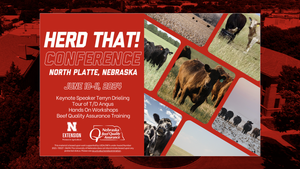Iowa beef industry initiative supports the vulnerable during pandemic
The #BeefUpIowa initiative connects 4-H members with local food banks to help feed those in need.
July 23, 2020

A new food bank program initiated in Iowa in early July is delivering ground beef processed at Iowa State University (ISU) to food banks across the state. Sponsored by the Governor’s office, the program aims to facilitate the link between 4-H steer owners, the ISU meat lab processing plant and those who are food insecure.
Under the program, steers are purchased from local 4-H members and the ground beef is donated to food banks in need. The Iowa Cattlemen’s Association plays a role in managing donations and the purchase and delivery of steers to the ISU packing plant at the Ames, Iowa campus.
Packing capacity
Terry Houser, ISU Extension meat specialist, says the lack of meat packing capacity in Iowa as a result of COVID-19 lockdowns has created a bottleneck in the supply chain. “We have lots of 4-H animals in the area that don’t have a processing facility available to go to, and meanwhile, the food bank needs are increasing as more locals become food-insecure,” Houser says.
The ISU campus is home to a USDA-approved meat lab and packing facility which is normally used for both student and industry training and up-skilling. “The Iowa Cattlemen’s Association came to us with the idea of using the ISU facilities for this project and although the facility is USDA approved, there were many challenges to overcome as a result of new COVID-19 protocols,” Houser says.
To keep staff safe and healthy at the campus plant, new protocols such as pre-screening body temperature checks, face coverings worn at all times while in the plant and a four-time daily cleaning and disinfecting regime had to be implemented. “The USDA office was also very stringent on the need to keep their safety inspectors healthy and safe from any potential Covid-19 contact,” Houser says. Given the spread of the virus at industrial packing facilities, many USDA inspectors have fallen ill in recent weeks.
Donations
“It’s great to see the first group of steers arrive at ISU for processing,” says Rex Hoppes, executive director at the Iowa Beef Industry Council. “It’s important to help out our 4-H youth as these kids are the future of our industry.”
Funding for processing the steers has been secured under the CARES Act program for up to 100 head of cattle. However, the Iowa Cattlemen’s Association is relying on donations to fund the purchase of the steers.
“We’re typically buying steers at 1,000 to 1,200-pound weights and we pay market value to the 4-H owners to help support the hard work they’ve carried out raising the steers,” Hoppes says. Donations can be made online at a ‘Giving Box’ found at the Iowa Cattlemen’s Foundation website.
Return to source
The program aims to return 50,000 pounds of ground beef to the local area from where the steers were sourced. The Iowa Food Bank system has a distribution network of six locations around the state and are facilitating the transport and distribution of the packaged beef.
“We started with five head of cattle on July 9th and we hope to run 10 head per week through the ISU plant over the next few months,” Houser says. The packing processes is labor intensive as the entire carcass must be boned out and packaged into 1-pound strips.
Despite the challenges, the Iowa beef industry has pulled together and shown how the industry can overcome issues and meet the needs of food-insecure people in the community. “All of us coming together through ISU, the Cattlemen’s Association and the Department of Agriculture is a great project serving so many of our neighbors across the state,” says Daniel Thomson, Department of Animal Science chair at ISU.
Cox is a dairy producer and freelance beef/dairy writer based in Missouri. The opinions of the author are not necessarily those of beefmagazine.com or Farm Progress.
You May Also Like



